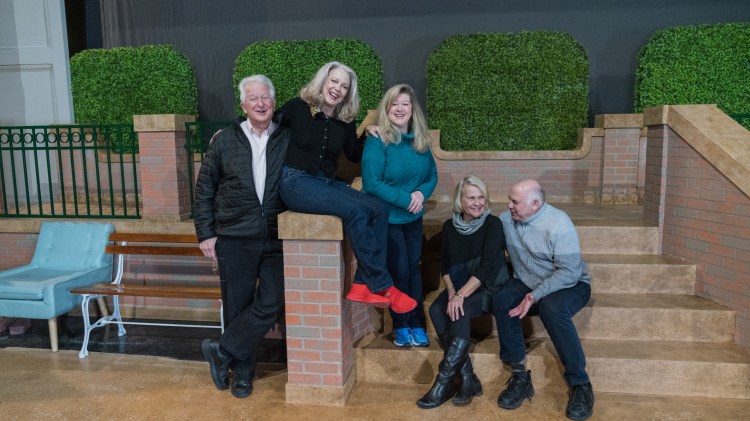In Senior Living, a talent show sets the scene for a series of life-changing vignettes that debate what to do with the time we have left. While it stars “old” people, it is about questions that we all struggle with in our lives.
Writers Tor Hyams and Lisa St. Lou and director Judith Ivey, a Tony and Emmy Award winning actress, were part of a laughter-filled conversation a few days into rehearsals for the world premiere play.
Since there’s no way I could have seen it, I have to ask: what is Senior Living about?
Tor: It’s about an older couple, Morty and Angelina, who are debating whether to move into a retirement community. But it’s not about old people. It’s about what we are doing with our time. We have no idea what will happen in the next five minutes. So, what are we doing?
Lisa: The stories are connected by the through line of a talent show, so you see them doing the thing to make the most of the time that they have left. The crux of this play is heart and heart is universal.
Tor: Our goal is often to make people laugh and then pull the rug out from under them. So we hope we can give people get that beautiful, happy-sad feeling.
Lisa: We’ll find out!
This is a big part of our population that is often on the outside of our stories. It might be toward the end of someone’s life, but they’re still living, changing and growing, right?
Tor: There’s a big conversation about marginalized groups—gender based, race based—and no one really talks about age marginalization. We didn’t start writing it for this reason, but as we wrote about it, we thought of how this is a group underrepresented on stage, especially women.
Lisa: And we’re calling this a marginalized group, but the demographic is actually everyone, because we all get old.
Judy, as a “woman of a certain age,” was there a moment in your career where people started perceiving you differently than you perceived yourself?
Judy: I was doing the movie Washington Square based on the story by Henry James. I was playing the sister of the character played by Albert Finney and I filmed all of my first scenes with just him. And we had wonderful conversations, talking about the theater and what we loved. And I’m of an age where him playing Tom Jones, he was the sexiest man alive. I was only 47 but I totally forgot I was 47 and I was flirting. And it looked like he was flirting back! Now, Jennifer Garner played my daughter. It was one of her first films. The day arrived where all these characters are lined up to receive guests in a horse and cart. As we would wait for the next shot to be set up, Albert was standing next to her character’s fiancé, then it was me, and then it was Jennifer. And every time he wanted to talk, he would reach all the way around and talk to [in deep English accent] “Jennifuh.” And I thought “You son of a gun!” but then it hit me. Oh, that’s right, I’m the older woman. It was significant. People talked about, you wait, you will become invisible. And I wasn’t sure. Well…
Lisa: And I bet she’s 47 now!
I’ll Google it fast. Ha! She’s 49.
Tor: That’s the idea. Older people become invisible because society doesn’t see them as contributing to the bottom line.
Judy: Which is ironic because we are all here because of a play and in my 48 years of doing plays professionally, the patrons have always been older. The fact that we don’t necessarily cater to stories about those audiences has always made me scratch my head. I totally related to This Is Our Youth [by Kenneth Lonergan]. There isn’t one character in there who looks like me or fit in my demographic when I saw it. And when you write plays, like this one, I’m gonna guess that younger audiences members will relate to it on some level.
What does it feel like to work on something new versus something in the canon, like, say, The Glass Menagerie?
Lisa: John Cariani mentioned when he read Senior Living that we created a limitless world for the actor to find what they want to bring to it. The actors are giving something to this role that will then be set in a book, printed, it’s difficult but very exciting. Like this morning, we’re doing rewrites and figured something out, and we’re just jumping up and down going, “Oh my god! That’s it!”
Judy: I just love it! The bulk of my work as a director has been new plays. It’s been true of my acting career as well and I must sing Lisa and Tor’s praises. Not every writer you work with is as much fun to develop with.
Tor: The actors find something new in the play each day. It’s simply conversations and songs, it’s what the actor brings to it, what they put on the canvas, that can be amazing. In the best of worlds, you’re playing. People throw this “high art” perception at theater, but it’s a fun game. That’s life, we’re all a bunch of silly dreamers, trying to have fun.
This interview has been edited and condensed for clarity.
 Copy the Story Link
Copy the Story Link
Comments are not available on this story.
Send questions/comments to the editors.


